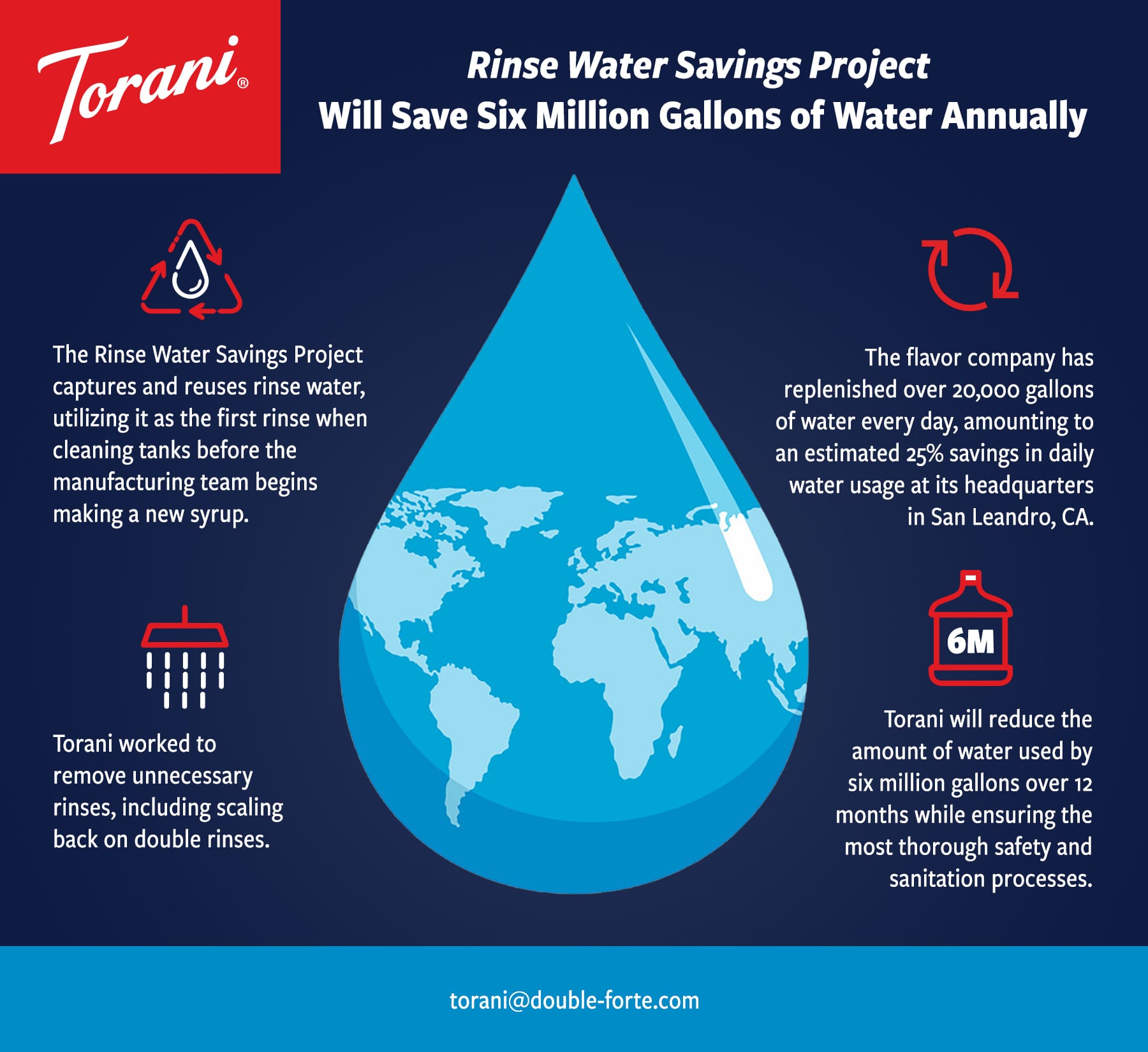Torani Expands Sustainability Focus From Workforce to Environment
As Torani is set to 100, the drink syrup company is formalizing and ramping up it's sustainability efforts.

Never laying off a single employee in nearly a century might seem like an unsustainable business strategy, but Torani has proven that prioritizing employees' well-being can lead to high-growth, sustained financial performance too.
Now, as Torani is set to turn 100 in a few months, the flavored syrup company that's used in cafes around the world is looking to also show that making a positive social and environmental impact can also be good for the world and good for the bottom line.
Guided by its "Flavor for all, Opportunity for all" ethos, Torani is "looking at how we build 'The Opportunity Company' inside and out," says CEO Melanie Dulbecco.
Yet the world of sustainability has changed. Many consumers and others such as governments are no longer taking companies at face value when they say they're committed to sustainability, rightfully so. Instead, stakeholders want clarity and accountability when it comes to setting and reaching sustainability goals.
Still, moving from good intentions to a clear sustainability roadmap that's integrated into a company's operating structure isn't easy.
"We're looking at how do you go from a small business trying to do the right things to a large company that sets up all the mechanisms and measures and approaches" to make a big difference in the world, explains Dulbecco. "It takes a lot of significant measurement. It's like setting up an accounting structure."
Opportunity for All
To create a more formal social impact and environmental sustainability strategy within the company, at the start of 2024 Torani created a new role, VP of purpose and strategic mobilization, filled by Stacy Cooper Dent, who has been with the company for over 20 years in roles such as brand director and director of international business.
In addition to Dent, Torani set up a team of 16 employees from across the business who expressed interest in making sustainability a more direct part of their jobs, and they are working together to find ways to set and implement sustainability strategies.
Torani has had green teams in the past, which made some positive albeit ad-hoc contributions, like composting efforts. Now, this new sustainability-focused team "is going to be making proposals to our executive team for alternatives to the way we run the business," says Dulbecco.
These proposals are being guided by the work of external experts, with Torani, a B Corp, leveraging the B Corp network to find expert resources, as well as working with a sustainability consulting firm.
"What we found is that it's pretty hard to get to the next degree of seriousness, that we really need not only a person to lead it, but to get some outside experts in to help us shape it," says Dulbecco.
"We did a lot of initiatives on our own with really talented people in the company [like around water conservation and adding a solar array] but then we realized some of these are lists of ideas. How do we know where to invest more and what will actually have the greatest impact?"
"And that's when we started to work with some outside organizations," she explains. "So now they're helping us around sustainability accounting and where to target and set objectives for improvement."
In particular, Torani looks to address five target areas: emissions, water, waste, energy, and packaging/recycling.

Given the range of focus areas, Torani is drawing on contributions from across its workforce — including the employees who are specifically working on presenting new sustainability proposals to the executive team, but also from those who want to contribute when they can.
Not only can this help Torani gain potential benefits like saving money through lower energy costs, but it also helps fuel employee engagement and workforce development, something that Torani prides itself on.
"It gives them something outside their normal realm of work to make a contribution that they care about and that we care about," says Dulbecco.
Torani's efforts to create a great place to work with opportunities for economic growth include initiatives such as training hourly/front-line employees on new skills to earn certifications and increased pay. Torani also has an employee stock ownership plan (ESOP), giving workers an opportunity to literally buy into the company's success. Plus, Torani's efforts to be an opportunity company extend to community initiatives like offering grants to purpose-oriented cafes.
"What we realized is that when we look at those efforts and we look at environmental sustainability, the people that this matters most to are our own team members and our consumers," says Dulbecco. "Being an opportunity company means giving people the opportunity to play a role in that and to support us in those efforts."
Part of that will come through more external efforts to engage consumers and other stakeholders, with some new communication initiatives in the works starting around January.
Meanwhile, internally, team members are able to explore new areas. For example, Dulbecco points to a manufacturing team member who's passionate about environmental sustainability and can apply and develop her interests and skills beyond manufacturing, such as in communication.
Being part of the sustainability team "gives somebody the opportunity to use the skills from their function, but also bust out a little bit and apply some other broader-based skills," says Dulbecco. "People get to bring their passions to it. And I think it's one of the reasons we have a lot of longevity among our team members," says Dulbecco.
Helping Other Businesses
As Torani looks to formalize its environmental sustainability efforts, such as with plans to publish an impact report in early 2025, it also hopes to create a more detailed template that other businesses can follow.
"We turn 100 in January. It's a really pivotal moment for us to start saying a whole lot more. We have been just quietly working on our efforts inside the company and not communicating a whole lot for decades. And we realized we need to talk about it a whole lot more and we want to dial up our social impact efforts," says Dulbecco.
That includes ramping up efforts to tell "the stories of our customers doing amazing things," and "really looking at how do we begin to share some of our own practices much more broadly in the business community and engage more businesses in talking about how to operate as more radically people-first," she adds.
Talking about corporate culture or being people-first can sound "squishy," notes Dulbecco. But "we know the financial strength comes from that and prove it…with a track record that we have of 33 years of sustained 20%+ growth year over year."
When it comes to "financial success, we want to show how this goes hand-in-hand with operating in a very different way," adds Dulbecco.
Disclosure: Our parent company, JournoContent LLC, has clients involved in sustainability-related areas, among others. The owner of Carbon Neutral Copy, Jacob (Jake) Safane, has investments in AI and sustainability-related companies, among others.
As such, conflicts of interest related to these and other investments/business relationships, even if unintended, may exist at times. Please email info@carbonneutralcopy.com if you'd like further clarification on any issues.
